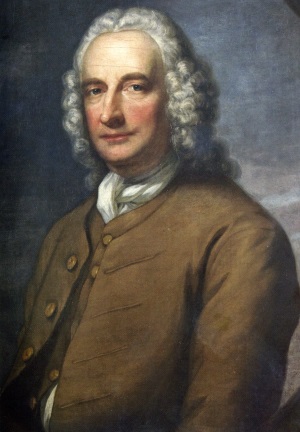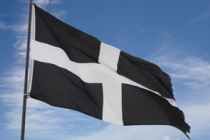Ralph Allen - Cornish founder of the modern postal service, creator of Georgian Bath, Mayor of Bath and philanthropist

Ralph Allen was baptised in Cornwall in 1693 and at the age of 14 became a clerk at the Post Office at St. Columb Major, Cornwall.
Ralph Allen's grandmother ran the Post Office at St. Colomb Major. When he was 14 her health deteriorated and he ran the Post Office on her behalf. At this time St. Colomb Major was a more important town than Truro.
It is thought that Quash, a Postal Surveyor, would have called at this Post Office and met the efficient young Allen.
It was probably as a result of this meeting that the young Allen was and later given the exalted position of Postmaster of Bath as a young man of 19.
At the age of 27 Allen took control of the Cross and Bye Posts under a seven year contract to the Post Office agreeing to pay £6,000 per annum, about half a million pounds today.
At the end of period he had not made a profit as he only broke even but he had the courage to continue. He reformed the postal service, creating a network of postal roads that did not pass through London. It is estimated that he saved the Post Office £1,500,000. Ralph Allen continued to sign contracts, paying £6,000 per annum every 7 years until his death.
Eventually Allen made himself a lot of money from the development of the postal system, and invested in land and development.
He acquired the stone quarries at Combe Down just as the building boom started in Bath, and from his quarries came the stone for building the Georgian city, making Allen a second fortune. Although he had a beautiful Palladian Mansion built for himself (1742) on a hill overlooking the city, "To see all Bath, and for all Bath to see", he was a benevolent man.
He was a benefactor to the poor, he gave money and the stone for the building of the Mineral Water Hospital in 1738, and even built cottages for his masons working in his quarries.
In 1725 he had been elected as a common council man of the city, and in 1742 he was elected Mayor. Allen was a great influence, and he had many of the well known people of his time as guests at his mansion at Prior Park.
Henry Fielding (1707-1754) a frequent guest used Ralph Allen as the model for Squire Allworthy in his novel, 'Tom Jones'.
Ralph Allen died at the age of seventy one in 1764 and is buried in a pyramid topped tomb in Claverton Churchyard.
Allen's work with the postal system had made a more efficient and reliable service, and another man John Palmer continued this when he developed the Mail Coach Service, rather than the post being carried on horse back as had been done in Allen's time.
This article has been kindly provided by Kernow Matters to Us and is part of the series on Famous Folk of Kernow (Cornwall).
- Cornish
- English
- Log in to post comments





